Today Current Affairs: 18th May 2022 for UPSC IAS exams, State PSC exams, SSC CGL, State SSC, RRB, Railways, Banking Exam & IBPS, etc
Table of Contents
Food Inflation:

Food prices around the world have soared to record levels this year as the Russia-Ukraine war slashes key exports of wheat and fertiliser from those countries, at the same time as droughts, floods and heat fuelled by climate change claim more harvests.
- The Food and Agriculture Organisation’s food price index has shown a 29.8% year-on-year increase for April 2022.
- Moreover, all commodity group price indices have posted huge jumps: Cereals (34.3%), vegetable oils (46.5%), dairy (23.5%), sugar (21.8%) and meat (16.8%).
- Simply put, food inflation is already rising across-the-board globally — because of supply disruptions from the war, dry weather in South America, high crude prices inducing greater diversion of corn, sugar, palm and soyabean oil for bio-fuel, and so on.
Causes of Food Inflation:
- Russia and Ukraine supply about 30% of global wheat exports, but those have fallen as a result of the conflict.
- National stocks of wheat – mostly eaten in the countries where it is grown – remain relatively high.
- But the drop in exports from Russia and Ukraine has driven up competition for the remaining wheat on the global market, leading to higher costs that are particularly painful for poorer, debt-ridden countries that rely heavily on imports.
- Almost 40% of Africa’s wheat imports come from Ukraine and Russia, while rising global wheat prices have sent bread prices in Lebanon 70% higher.
- Since the last food price crises of 2007-2008 and 2011-2012, governments have failed to curb excessive speculation and ensure transparency of food stocks and commodity markets
Thomas Cup 2022:

India’s men’s badminton team won the Thomas Cup title for the first time ever.
- India have defeated the 14-time champions Indonesia. The tournament was held in Bangkok (Thailand).
- Thomas Cup, trophy signifies the world supremacy in the sport of badminton.
- It is a 16-nation team event.
- The cup was donated in 1939 by Sir George Thomas for a series of men’s international team competitions to be managed by the International Badminton Federation (IBF), of which Thomas was then president.
- The first tournament was held in 1948–49 and won by Malaya.
- Thomas and Uber Cup is the biennial international badminton championship contested by the men and women’s national teams.
- India’s Win: In the tournament’s seven-decade-long history, the championship title has changed hands only among five nations – China, Malaysia, Indonesia, Japan and Denmark.
- With its win, India became only the sixth country ever to break into this elite club.
Sri Lanka’s 21st Constitutional Amendment:
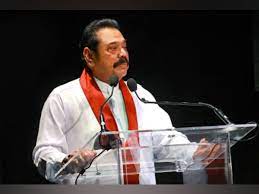
The government of Sri Lanka intends to introduce the 21st Constitutional Amendment Bill.
- The 21st Constitutional Amendment seeks to repeal the 20th Amendment.
Overview of the 21st Amendment:
- It seeks to reduce the Presidency to a ceremonial position, retaining the powers of the President on all three armed forces.
- However, almost all other key powers pertaining to governance, and cabinet ministers will be handed over to the Prime Minister.
- It seeks to transfer powers of making key appointments from the President to the Constitutional Council.
- The President would be required to act on the Prime Minister’s advice to determine the scope and functions of ministries and appoint ministers, deputy ministers and state ministers.
India’s Forex Reserves Have Dropped Below $600 Billion:

India’s forex reserves have dropped below $600 billion, plunging by about $45 billion since September 3, 2021, when forex reserves stood at an all-time high of $642 billion.
Reasons behind drop in India’s forex reserves:
- The drop is because of a fall in the dollar value of assets held as reserves by the RBI.
- The demand for dollars remained high as the Russia-Ukraine war led to a spike in oil and commodity prices.
- Capital outflows by foreign portfolio investors (FPIs): FPIs pulled out $21.43 billion since September 2021 as the US Federal Reserve started monetary policy tightening and interest rate hikes.
- Effect of gold prices: Decline in gold prices has also played a part in the decline in foreign exchange reserves.
- Indian rupee fell to an all-time low against the US dollar, breaking through the 77 rupees to a dollar threshold and trading at 77.63 on Thursday (12th May).
- If the rupee continues to fall, the Reserve Bank of India will be forced to interfere in the forex market by selling dollars from its foreign exchange reserves.
- If the RBI prioritises maintaining the amount of foreign exchange reserves, the rupee could depreciate.
What Is Endosulfan?

The Supreme Court has slammed the Kerala government for State’s inaction in providing relief to the Endosulfan pesticide exposure victims.
- This also amounts to a breach of the apex court’s 2017 judgment, which had ordered the State to pay ₹5 lakh each to the victims in three months.
- From the mid-70s, Kerala villages used aerial spraying of endosulfan on 4,600-ha. cashew nut plantation. Locals reportedly experienced illnesses, palsies and deformities.
Endosulfan:
- It is a widely-banned pesticide with hazardous effects on human genetic and endocrine systems.
- It does not occur naturally in the environment.
- It is listed under the Rotterdam Convention on the Prior Informed Consent.
- Use of endosulfan is banned by Stockholm Convention on Persistent Organic Pollutants.
- The Supreme Court in India has banned the manufacture, sale, use, and export of endosulfan throughout the country, citing its harmful health effects in 2011.
Uses:
- Sprayed on crops like cotton, cashew, fruits, tea, paddy, tobacco etc. for control of pests in agriculture such as whiteflies, aphids, beetles, worms etc.
Effects on humans:
- This pesticide is a known carcinogen, neurotoxin and genotoxin (damages DNA).
- Endosulfan blocks the inhibitory receptors of the CNS, disrupts the ionic channels and destroys the integrity of the nerve cells.
Environmental effects:
- Endosulfan in the environment gets accumulated in food chains leading to higher doses causing problems.
- If Endosulfan is released to water, it is expected to absorb to the sediment and may bioconcentrate in aquatic organisms.
Kanheri Caves:
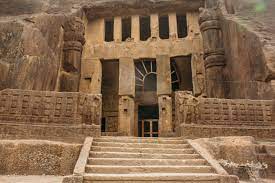
Union Minister of Tourism, Culture and DoNER inaugurates amenities at ancient Kanheri Caves on the occasion of Buddha Purnima.
- The Kanheri Caves are a group of caves and rock-cut monuments cut into a massive basalt outcrop in the forests of the Sanjay Gandhi National Park, on the former island of Salsette in the western outskirts of Mumbai.
- The Kanheri caves comprise more than 110 different rock-cut monolithic excavations and is one of the largest single excavations in the country.
- These excavations were primarily undertaken during the Hinayana phase of Buddhism but also has several examples of the Mahayana stylistic architecture as well as few printings of the Vajrayana order.
- The name Kanheri is derived from ‘Kanhagiri’ in Prakrit and occurs in the Nasik inscription of the Satavahana ruler Vasisthiputra Pulumavi.
- They contain Buddhist sculptures and relief carvings, paintings and inscriptions, dating from the 1st century CE to the 10th century CE.
- Kanheri was mentioned in the travelogues of foreign travellers.
- The earliest reference of Kanheri is ascribed to Fa-Hein who visited India during 399-411 CE.
First International Migration Review Forum:
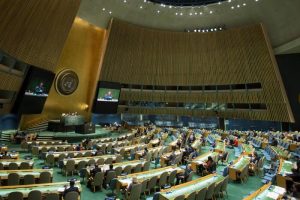
Minister of State for External Affairs V. Muraleedharan will lead the Indian delegation for the First International Migration Review Forum being held under the auspices of the General Assembly at the United Nations in New York from 17th to 20th of May.
- It will serve as the primary inter-governmental global platform to review the progress made at the local, national, regional and global levels in implementing the Global Compact for Safe, Orderly and Regular Migration (GCM).
- It will consist of four interactive multi-stakeholder round tables, a policy dialogue and a plenary.
- In the General Assembly resolution A/RES/73/195, Member States agreed to review the progress made at the local, national, regional and global levels in implementing the GCM in the framework of the United Nations.
The Ramgarh Vishdhari Sanctuary : India’s 52nd Tiger Reserve
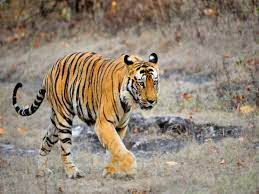
The Ramgarh Vishdhari Sanctuary in Rajasthan was notified as India’s 52nd tiger reserve, Union Environment Minister Bhupender Yadav said.
- This is Rajasthan’s fourth tiger reserve after Ranthambore, Sariska and Mukundra.
- Ramgarh Vishdhari Wildlife Sanctuary and adjoining areas as tiger reserves on July 5 last year.
- The newly notified tiger reserve includes the tiger habitat between Ranthambore Tiger Reserve in the northeast and Mukundra Hills Tiger Reserve on the southern side and facilitates dispersal of tigers from Ranthambore Tiger Reserve.
- According to “Status of Tigers in India” report released in 2019, there are 2,967 tigers in 20 states across the country.
Global Report On Assistive Technology:

The World Health Organisation (WHO) and United Nations Children’s Fund (UNICEF) jointly launched the first Global Report on Assistive Technology (GReAT).
Highlights of the Report:
- More than 2.5 billion people need one or more assistive products, such as wheelchairs, hearing aids, or apps that support communication and cognition.
- A billion of them are denied access, particularly in low- and middle-income countries, where access can be as low as 3% of the need for these life-changing products.
- The number of people in need of one or more assistive products is likely to rise to 3.5 billion by 2050, due to populations aging and the prevalence of non-communicable diseases rising across the world.
- Also, affordability is a major barrier to access.
- A survey of 70 countries featured in the report found large gaps in service provision and trained workforce for assistive technology, especially in the domains of cognition, communication and self-care.
Assistive Technology (AT):
- AT is any item, piece of equipment, software program or product system that is used to increase, maintain or improve the functional capabilities of persons with disabilities.
The Places Of Worship Act:
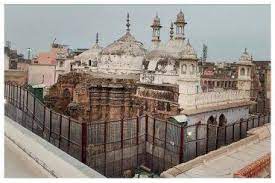
An appeal against the video survey of Varanasi’s Gyanvapi mosque will be heard by the Supreme Court.
- The survey, according to a Muslim organisation, is in violation of the places of worship act, 1991.
- During a court-ordered videography survey of the Gyanvapi Masjid complex by a municipal court in Varanasi, a “shivling” was apparently discovered.
- The Gyanvapi Masjid is located near the iconic Kashi Vishwanath temple in Uttar Pradesh’s Varanasi.
The Places Of Worship Act, 1991:
- The Act states that a place of worship’s religious nature must remain the same as it was on August 15, 1947.
- It says no person shall convert any place of worship of any religious denomination into one of a different denomination or section.
- It declares that all litigation, appeals, or other proceedings ongoing before any court or authority on August 15, 1947, involving converting the status of a place of worship, will cease as soon as the law takes effect. There will be no more legal action taken.
The following are exempt from these provisions:
- Ancient and historical monuments and archaeological sites and remains that are covered by the Ancient Monuments and Archaeological Sites and Remains Act, 1958.
- A suit that has been finally settled or disposed of; and any dispute that has been settled by the parties or conversion of any place that took place by acquiescence before the Act commenced.
- The Act also does not apply to the place of worship commonly referred to as Ram Janmabhoomi-Babri Masjid in Ayodhya.
- This law will have an overriding effect over any other law in force.




